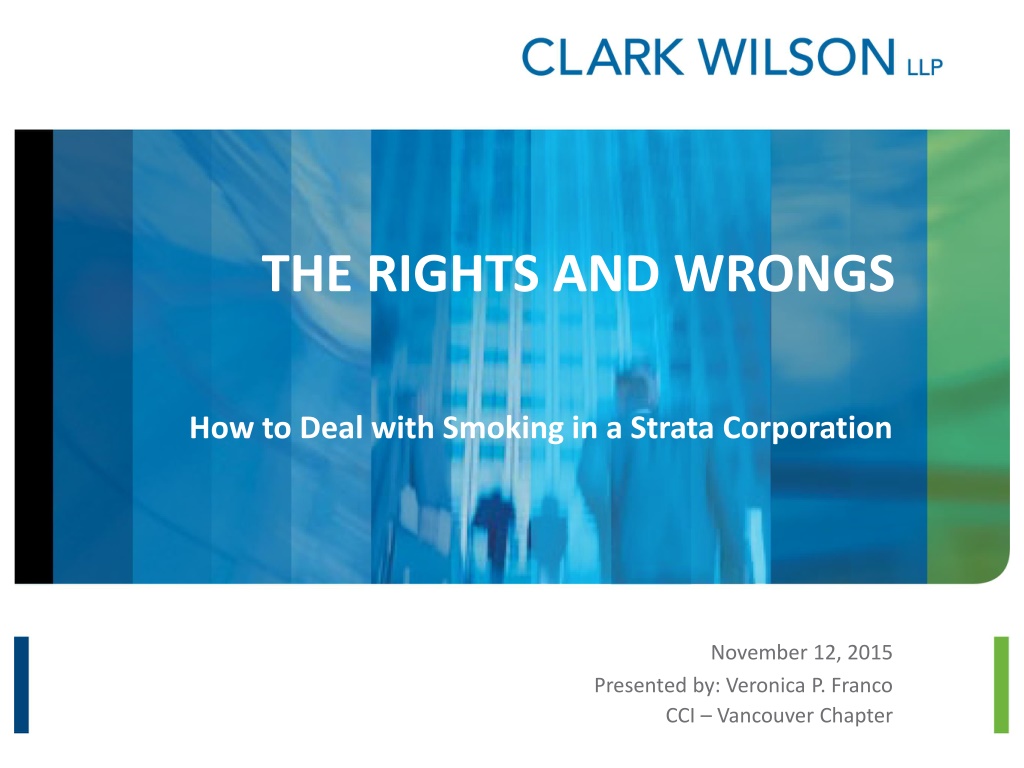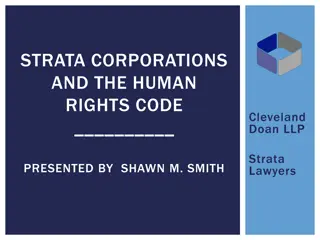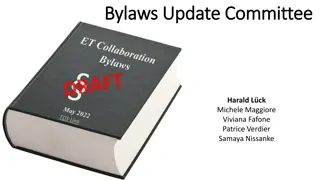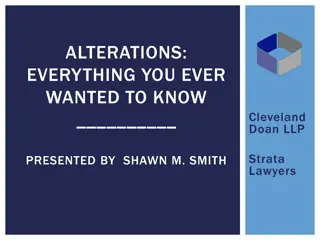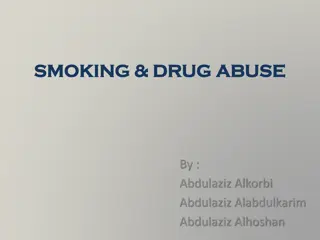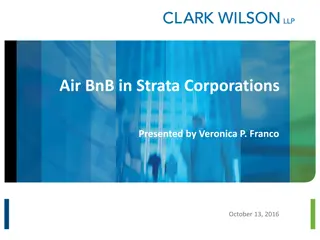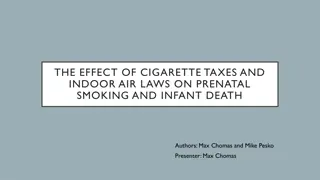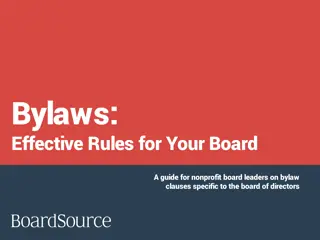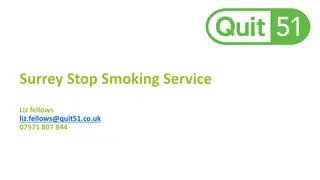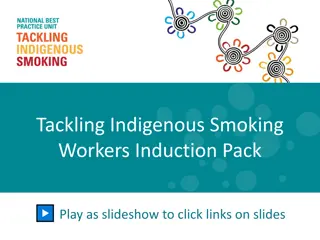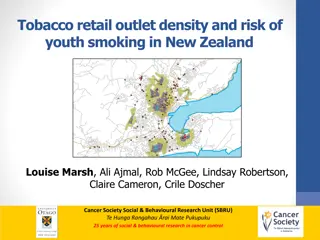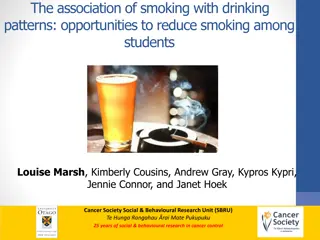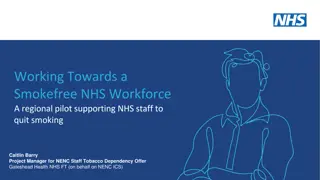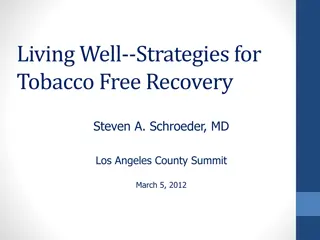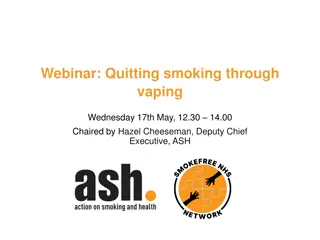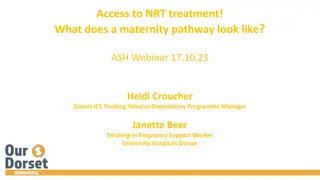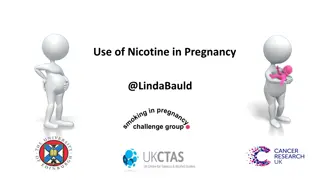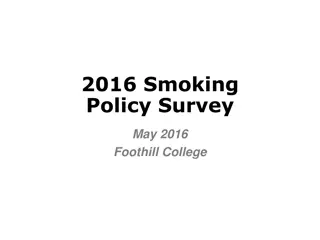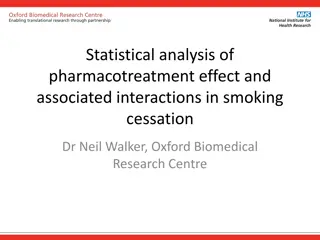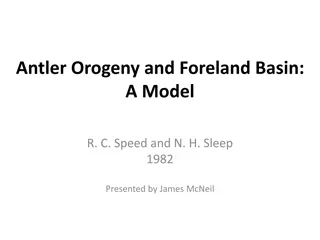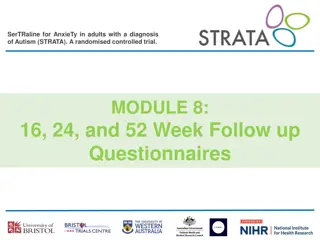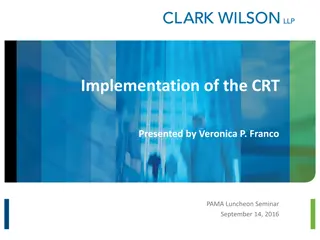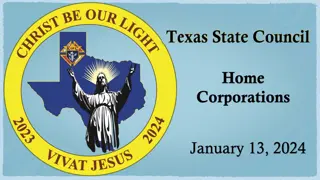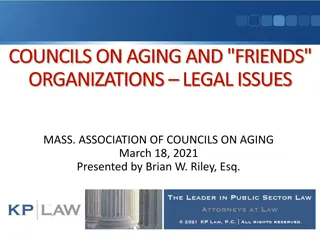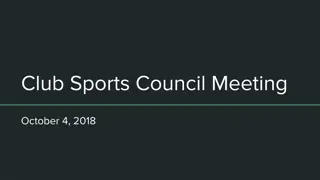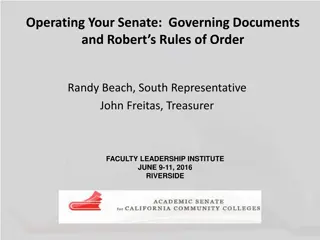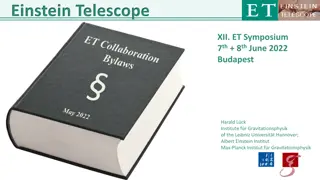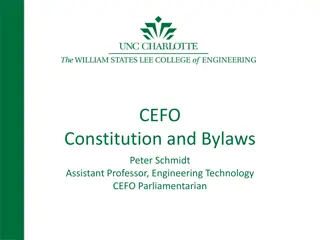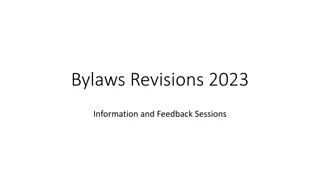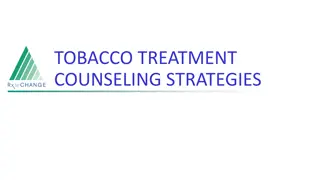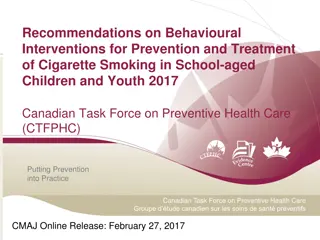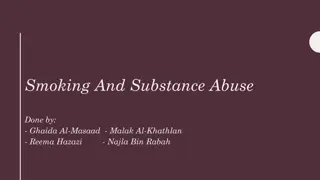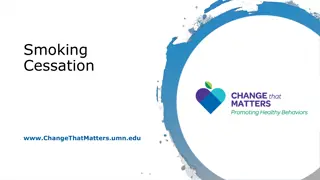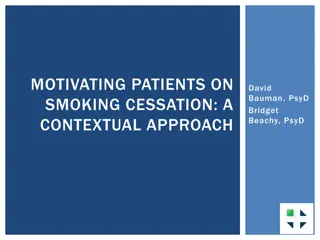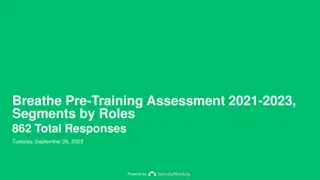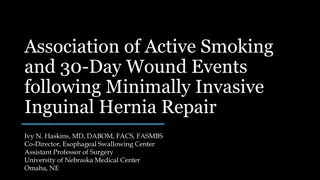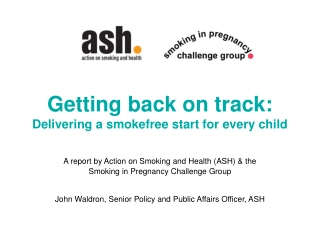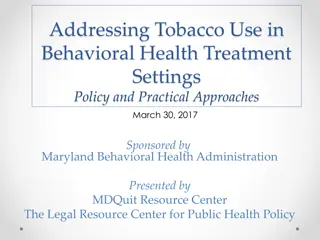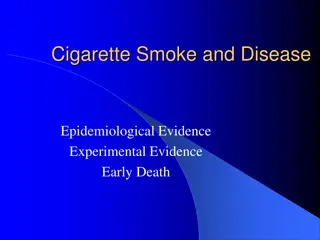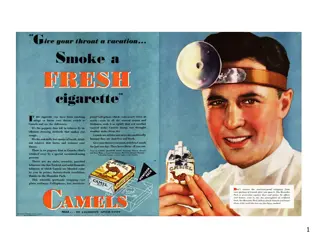Dealing with Smoking in Strata Corporations: Legislation, Bylaws, and Strategies
Explore the challenges and solutions related to smoking in strata corporations, including the need for smoking bans, the role of council, provincial legislation impacting smoking, and strategies for managing smoking complaints. Learn how to address smoke allergies, smoking addictions, and the risks of secondhand smoke within strata communities.
Download Presentation

Please find below an Image/Link to download the presentation.
The content on the website is provided AS IS for your information and personal use only. It may not be sold, licensed, or shared on other websites without obtaining consent from the author. Download presentation by click this link. If you encounter any issues during the download, it is possible that the publisher has removed the file from their server.
E N D
Presentation Transcript
THE RIGHTS AND WRONGS How to Deal with Smoking in a Strata Corporation November 12, 2015 Presented by: Veronica P. Franco CCI Vancouver Chapter
SMOKING The new flashpoint Smoke allergies; Smoking addictions; and Dangers of second hand smoke 2
WHAT WE ARE GOING TO DISCUSS TODAY Where are we on banning smoking today? Is a smoking ban bylaw necessary before the council must get involved? What role does the council play in dealing with the smokers and complaints of smoking? What are some strategies in dealing with smoking complaints and smokers? Should the strata corporation consider banning smoking on all or parts of the strata plan? 3
Legislation and Bylaws that Impacts smoking WHERE ARE WE ON BANNING SMOKING TODAY?
Provincial legislation that impacts smoking Tobacco Control Act, R.S.B.C. 1996, c. 451 No smoking in or near certain places 2.3 (1) Subject to subsection (2), a person must not smoke tobacco, or hold lighted tobacco, (a) in any building, structure, vehicle or any other place that is fully or substantially enclosed and (i) is a place to which the public is ordinarily invited or permitted access, either expressly or by implication, whether or not a fee is charged for entry, (ii) is a workplace, or (iii) is a prescribed place, or (b) within a prescribed distance from a doorway, window or air intake of a place described in paragraph (a). 5
Provincial legislation that impacts smoking (Contd) Tobacco Control Regulation, B.C. Reg. 232/2007 Other places where smoking not permitted 4.21 places are prescribed as places in which a person must not smoke tobacco or hold lighted tobacco: For the purposes of section 2.3 (1) (a) (iii) of the Act, the following (a) dormitories; common areas of apartment buildings, condominiums and No smoking near doorways, windows or air intakes 4.22 (1) For the purposes of section 2.3 (1) (b) of the Act, the prescribed distance from a doorway, window or air intake in which a person must not smoke tobacco, or hold lighted tobacco, is 3 metres. 6
Provincial legislation that impacts smoking (Contd) Summary of Tobacco Control Act: No smoking is permitted in: Substantially or fully enclosed common areas: hallways, foyers, lobbies, elevators, utility rooms, amenity rooms, underground parkades, laundry rooms, reception rooms, and public washrooms, but also outdoor spaces that are substantially enclosed Three metre buffer zones: within three metres of a doorway, window or air intake of common areas of apartment buildings, condominiums and dormitories 7
Provincial legislation that impacts smoking (Contd) Tobacco Control does not apply to ban smoking: Of non-tobacco substances (i.e. marijuana) In Strata lots In Substantially or fully enclosed limited common property where exclusive use is granted in relation to one strata lot On balconies, decks and patios that do not fall within buffer zone and exclusive use is granted in relation to one strata lot 8
Provincial legislation that impacts smoking (Contd) Liability of the strata corporation and property managers under the Tobacco Control Act 2.3 (3) in respect of a place described under subsection (1) (a) (i) or (iii), each manager, owner and lessee of the place is deemed to have contravened that subsection and each is liable for the contravention. Subject to subsection (5), if any person contravenes subsection (1) manager, owner, lessee or employer, as applicable, demonstrates that he or she exercised reasonable care and diligence to prevent the contravention. (5) It is a defence to a charge under subsection (3) or (4) if the 9
Provincial legislation that impacts smoking (Contd) Vaping: Bill 14 which has been approved amends the Tobacco Control Act to apply similar restrictions as cigarette smoking while recognizing that ecigarettes are used for smoking cessation; regulations will bring those amendments into force. Marijuana Smoking: Assuming the federal government does legalize marijuana, will the provincial government amend the Tobacco Control Act to deal with marijuana smoke? 10
Federal legislation that impacts smoking Controlled Drugs and Substances Act, S.C. 1996, c. 19 4. (1) Except as authorized under the regulations, no person shall possess a substance included in Schedule I, II or III. Marijuana and its derivatives are Schedule II drugs. Exception: Access Regulation, SOR/2001 227 for an authorization to possess dried marijuana for a medical purpose. Once that authorization is granted, section 2 permits possession of marijuana, which means it can be smoked with impunity. A person can apply under section 4 of the Marijuana Medical 11
Municipal Bylaws that impact smoking Many BC municipalities have their own bylaws that impact smoking Check municipal bylaws to determine what smoking prohibitions exist Municipal bylaws could impose stricter prohibitions than those under the Tobacco Control Act Municipal bylaws could ban smoking of non-tobacco related substances (i.e. marijuana) 12
Municipal Bylaws that impact smoking (Contd) City of Vancouver Health Bylaw No. 9535 2.2 A person must not smoke: (a) in a building, except in: (i) a dwelling unit or sleeping unit defined under the Zoning and Development By-law including a dwelling unit in which an owner or occupier also carries on a business, (iii) enclosed premises: (A) that are not open to the public, (B) that are not private clubs or smoking clubs, a purpose of which is to allow patrons, customers, or other persons to smoke, and (C) where the only occupants are the owner or owners of the business carried on in the premises; (e) within six metres measured on the ground from a point directly below any point of any opening into any building including any door or window that opens or any air intake; 13
Municipal Bylaws that impact smoking (Contd) Enforcement of ban on smoking 2.3 Except as permitted by section 2.2, a responsible person must not suffer or allow a person to smoke in: (a) a building or customer service area; (b) premises or common areas; (c) an area described in section 2.2(e) or (g) except to the extent that all or part of such area is not part of the parcel on which the building or customer service area is situate and is not an area over which such responsible person has possession or control; or 14
Municipal Bylaws that impact smoking (Contd) Signs banning smoking 2.4 A responsible person must display, or ensure the display of, a sign at all times: (a) premises, or in a vehicle for hire, where section 2.2 prohibits smoking, stating: THIS IS A SMOKE FREE ENVIRONMENT NO SMOKING; and at each entrance to a building or customer service area or to (b) smoking, stating: on each exterior wall of a building, where section 2.2 prohibits SMOKING IS PROHIBITED WITHIN SIX METRES OF OPENINGS INTO THIS BUILDING INCLUDING DOORS AND WINDOWS THAT OPEN AND ANY AIR INTAKE. 15
Municipal Bylaws that impact smoking (Contd) Definitions premises means a portion of a building in respect of which a person has exclusive possession; responsibleperson means a person who owns, controls, manages, supervises, or operates: a business or other use which occupies all or substantially all of a building, (c) common areas and, in respect of common areas, includes a strata corporation or cooperative association; smoke or smoking means to inhale, exhale, burn, or carry a lighted cigarette, cigar, pipe, hookah pipe, or other lighted smoking equipment that burns tobacco or other weed or substance; 16
Municipal Bylaws that impact smoking (Contd) Differences between Health Bylaw and Tobacco Control Act No smoking inside buildings except strata lots vs. no smoking in common areas/public areas Larger buffer area (6 metres vs. 3 metres) Buffer areas apply to any point of entry into a building (and are not limited to entries to common areas of building) Signage is required under Health Bylaw No smoking of tobacco and other substances including marijuana under the Health Bylaw 17
IS A SMOKING BAN BYLAW NECESSARY BEFORE COUNCIL MUST BE INVOLVED?
Strata Property Act Standard Bylaws 3(1) An owner, tenant, occupant or visitor must not use a strata lot, the common property or common assets in a way that (a) causes a nuisance or hazard to another person (c) unreasonably interferes with the rights of other persons to use and enjoy the common property, common assets or another strata lot (d) is illegal 19
Are the Standard Bylaws Enough? Duty to enforce the bylaws Strata Property Act 26 bylaws, the council must exercise the powers and perform the duties of the strata corporation, including the enforcement of bylaws and rules. Subject to this Act, the regulations and the 20
Human Rights Code and Smoking (contd) Kabatoff and Kabatoff v. Strata Corp. NW 2767 Kabatoffs suffered from a number of health problems including respiratory illnesses and allergies that are exacerbated by smoke. Strata corporation tried to have the complaint dismissed on the basis that it did not have a bylaw that banned smoking and so did not have the authority or ability to respond to the Kabatoffs complaints Tribunal held that the lack of a smoking prohibition bylaw was not sufficient to have the complaint dismissed. 21
Forcing a Council to enforce the bylaws Chorney v. The Owners, Strata Plan VIS770, 2011 BCSC 1811 Owners medical conditions were exacerbated by smoke. Smoke entered the owners the strata lot. Court appointed administrator (appointed for other reasons) investigated, agreed it was a nuisance, and issued warnings. The smoker did not deny smoking, but also continued to smoke. Administrator s vote resolution to authorize lawsuit to obtain an injunction to ban her from smoking failed. While the Court held that this was a proper case to seek an injunction, it was premature since strata enforcement procedures were available and had not been attempted. 22
What Role Does Council Play? Duty to enforce the bylaws Strata Property Act 26 bylaws, the council must exercise the powers and perform the duties of the strata corporation, including the enforcement of bylaws and rules. Subject to this Act, the regulations and the 24
Strata Property Act and Bylaws Strata receives a complaint about smoking: 1. Determine which bylaw(s), if any, apply 2. Investigate complaint Council must decide if the smoke is a nuisance or an unreasonable interference 3. Enforce the bylaws using the tools available under the Act Warning section 129(2) Fine section 135 procedure Deny access to recreational facility section 135 procedure Injunction vote resolution section 133 procedure 25
Is the Smoking a Nuisance or Unreasonable Interference? Principles: Nuisance is an unreasonable interference with the use and enjoyment of land [Royal Anne Hotel Co. Ltd. v. Ashcroft et al.] Consider the nature of the injury suffered, the frequency of the occurrence, and its duration. The interference must be substantial and serious to result in a finding of nuisance. Strata corporation residents are required to exhibit more cooperation and respect for others to ensure that all can enjoy their home to the fullest extent [The Owners, Strata Plan NW 87 v Karamanian] The standard is not of the overly sensitive person, but rather the standard of an ordinary reasonable person [Popoff v. Krafczyk] 26
Is the Smoking a Nuisance or Unreasonable Interference? Raith v. Coles(1984) BCSC Residents complained of continuous and pervasive cigar smoke. Residents did everything they could to resolve the problem: talked to their neighbour, installed fans, and kept their windows and doors shut. Residents provided medical evidence that the cigar smoke had a significant impact on their health, including nausea, indigestion, sore throats and emotional anxiety. Court held that they were not unreasonable in their objections to the nuisance created by the cigar smoke. This was not a simple dislike of the smell. There was concern based on medical grounds. The smoke was harmful and so it was a nuisance. 27
Human Rights Code and Smoking McDaniel and McDaniel v. Strata Plan LMS 1657 (No. 2) Second-hand smoke from limited common property infiltrated their suite and exacerbated their physical disabilities. Strata corporation did not dispute their disabilities. Over half their time as owners (three years), they were subjected to smoke that was unacceptable and debilitating causing escalated health risks and stress levels. Strata refused to try to pass a smoking prohibition bylaw based on anecdotal evidence of council member claiming at a general meeting that the strata corporation only had the power to ban marijuana smoke. Strata did not attempt to enforce its anti-nuisance bylaw. Owners, forced by finances, to abandon their unit. 28
Human Rights Code and Smoking (contd) Strata corporation admitted that their attempts to accommodate were limited to: 1. Suggesting the McDaniels bring in an air conditioner; 2. Suggesting the McDaniels attempt to gain the support of 25% of owners, required to trigger a Special General Meeting, to enact a Non-Smoking By-law; 3. Asking residents who smoke to be respectful of others; 4. Writing the three owners below the McDaniels not to smoke on their patios; and 5. Considering a smoking ban. Strata admitted that it had failed to accommodate the owners disabilities. 29
Human Rights Code and Smoking (contd) Tribunal awarded the McDaniels: $6,500 as compensation for injury to their dignity, feelings and self-respect. $1,518.88 for expenses including the costs of the air conditioner, naturopathic consultations and travel expenses to attend the hearing. 30
How do you determine if there has been a bylaw contravention? Go to the affected unit when it happens or afterwards GOAL: Council has to be able to see or feel for themselves that it is a nuisance or an unreasonable interference. 31
What Role Does the Council Play? Balance the rights of competing residents Council must get involved To avoid conflict, create solutions 32
Strategies In Dealing with Smoking Complaints
Dealing with Smoke Possible Solutions: 1. Ban smoking entirely bylaw amendments 2. Undertake bylaw enforcement procedures 3. Attempt alterations to minimize smoke transfer 34
Dealing with Smoke - Alterations Install door sweeps and weather stripping around windows Fill or patch cracks in walls and ceilings Insulate the air spaces around plumbing pipes Insulate and place covers over electrical outlets Clean, change or install new filters in the ventilation system Add more fresh air intake into the ventilation system Restrict the amount of air exhausted through the ventilation system from units where there is smoking 35
Dealing with Smoke Alterations Why the strata corporation should consider paying? Cost of an injunction? Likely more buy in by the residents? Increased likelihood the alterations will be done? Avoid expensive litigation Deal with the issue before parties become entrenched in their positions. Consider expense in light of above. 36
Bylaw Enforcement Section 135 procedure: 1. Letter giving notice of the complaint includes particulars, bylaws, potential fines that could be levied, and deadline to respond; 2. Council meeting after deadline to respond passes, council meets and decides whether bylaw has been contravened and if so, whether to levy a fine. Council must consider any written response or submissions at a hearing; the decisions are reported in the minutes. 3. Letter to the owner advising of council s decision, including the amount of the fine, if any. 37
Bylaw Enforcement Stubborn Case Ask complainant to prepare a log over a two or three week period with date, time, duration, description, and impact on complainant Ex. On November 9, 2015 at about 9:15 pm - smelled cigarette smoke in living room; air was smoky, eyes watering, for hour. Each date and time is a bylaw complaint deal with all complaints in a single section 135 procedure Go to Small Claims Court to collect fines. 38
Dealing with the Smoker Bylaw enforcement Balancing interests Smoker s Rights 39
Human Rights Code and Smoking Section 121(1)(a) of the Strata Property Act A bylaw of the strata corporation is not enforceable to the extent it contravenes the Human Rights Code. Section 4 of the Human Rights Code The Human Rights Code prevails in the event of a conflict with other legislation. Human Rights Code applies to strata corporations. Williams v. Strata Plan LMS 768 Konieczna v. Strata Plan NW 2489 40
Human Rights Code and Smoking (contd) Most commonly used provision to launch a complaint against a strata corporation 8 justification, (1) A person must not, without a bone fide and reasonable (a) deny to a person or class of persons any accommodation, service or facility customarily available to the public, or (b) discriminate against a person or class of persons regarding any accommodation, service or facility customarily available to the public status, family status, physical or mental disability, sex, sexual orientation or age of that person or class of persons. because of the race, colour, ancestry, place of origin, religion, marital 41
Human Rights Code and Smoking (contd) Test to prove a section 8 Complaint: 1. Complainant must prove a disability and that the strata corporation discriminated on the basis of the disability. 2. Strata must show, if there is discrimination, that it was bona fide and reasonably justified Was the policy change/action reasonably necessary to accomplish a legitimate purpose or goal? Was it implemented in good faith, in the belief it was necessary to accomplish the goal? Would the strata corporation incur undue hardship by accommodating the complainant? 42
Human Rights Code and Smoking (contd) Possible complaints against the strata corporation: 1. By smokers where the strata corporation is enforcing a smoking ban; 2. By non-smokers where the strata corporation is not enforcing a smoking ban or an anti-nuisance bylaw and the non-smoker has a disability that is exacerbated by smoke 43
Human Rights Code and Smoking (contd) No Tribunal cases where smoker brings complaint against strata corporation, but addiction has been recognized as a disability: Bish v. Elk Valley Coal Corporation (cocaine) Cominco Ltd. v. United Steelworkers of America, Local 9705 (nicotine) 44
Human Rights Code and Smoking (contd) Youngv. Saanich Police Department (BCSC) Mr. Young had a licence to grow and smoke marijuana to treat his multiple sclerosis The landlord, Capital Region Housing Corporation (the CRHC ) received complaints from other tenants and suggested installing a door sweep on Mr. Young s door. Mr. Young filed a complaint alleging the CRHC did nothing to prevent other tenants from harassing him for using marijuana and by insisting in installing a door sweep on his door only resulting in decreased fresh air. 45
Human Rights Code and Smoking (contd) Human Rights Officer investigated and concluded that there had been no discrimination. The CRHC did responded to Mr. Young s complaints of harassment and asked the other tenants to stop. The door sweep would not reduce the air quality of his unit, but its installation was seen as a reasonable attempt to stop the smoke from entering the hallway. 46
Should the Strata Corporation Consider Banning Smoking
Should the Strata Corporation Consider Banning Smoking Why create a smoking bylaw or rule? Enforce provincial/municipal laws mandatory for strata corporation and property manager to enforce Provide clear rules regarding smoking Avoid having to determine whether smoking is a nuisance or unreasonable interference Unit marketability and health issues Repair and maintenance issues 48
Strata Property Act and Bylaws Bylaws can be used to deal with smoking: control where smoking can be permitted (i.e. strata lots, common property, limited common property, common property, exterior versus interior areas, balconies, decks, patios) determine which substances are banned (i.e. tobacco, marijuana, ecigarettes, etc.) Gradual or stepped bans Grandfathering? Accommodating a disability? 49
These materials are necessarily of a general nature and do not take into consideration any specific matter, client or fact pattern. Please direct inquiries or comments to: Veronica P. Franco, Clark Wilson LLP vfranco@cwilson.com | 604.891.7732 www.cwilson.com THANK YOU
